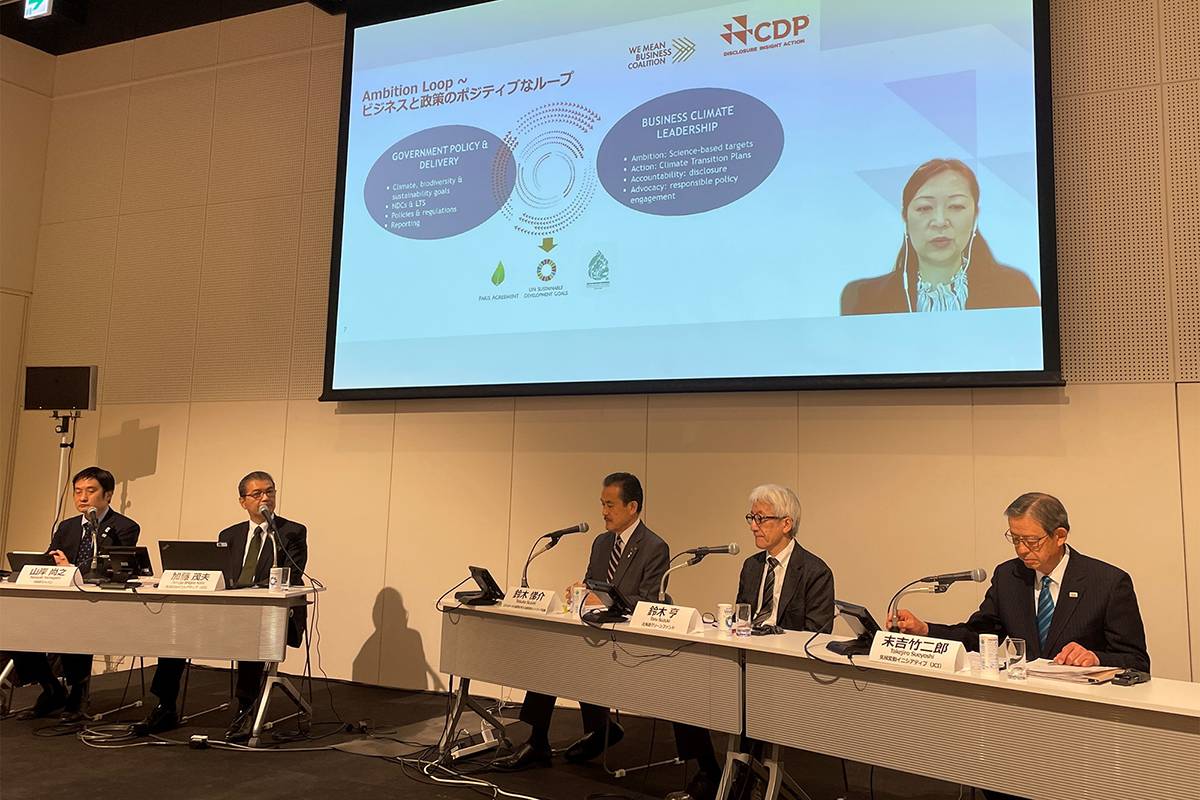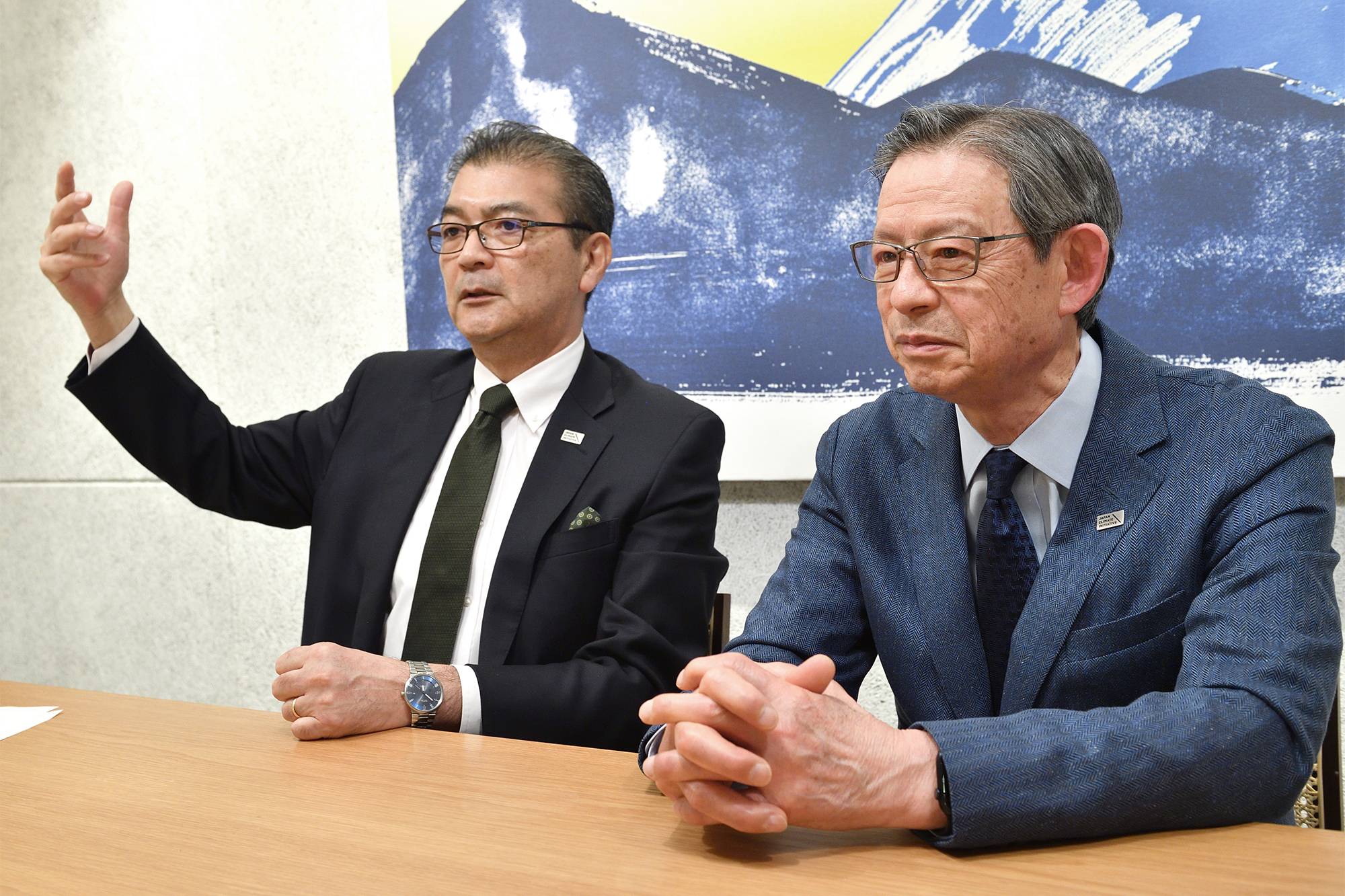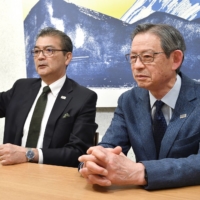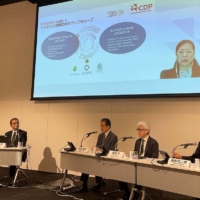The Japan Climate Initiative, a network that connects stakeholders who are taking action on climate change, held a news conference to announce the release of its message, “Overcoming Two Crises with Renewable Energy and Carbon Pricing,” in Sapporo on April 12, three days before the G7 Ministers’ Meeting on Climate, Energy and Environment in Hokkaido’s capital.
A list of 303 Japanese companies, local governments and other organizations that endorsed it was published with the message. The news conference was intended to call on the government to enforce policies and measures that will significantly accelerate energy transition, and to show the world that there are proactive nonstate actors in Japan who are trying to address the dual crisis with the hope that government will take stronger action.
The message points out that Japan’s target of converting 36% to 38% of all electricity derived from fossil fuel to renewable energy by 2030 is too low compared with the targets other G7 countries have set, and that the government’s plan to implement carbon pricing after fiscal 2028 is too slow. It states that the four G7 nations of Canada, Germany, the United Kingdom and Italy have already achieved a higher renewable energy ratio than the Japan’s 2030 target, and that renewable energy is projected to account for most of the electricity supply in the United States by 2035. It also mentions that the estimated carbon price level under Japan’s current policy is far lower than what the International Energy Agency recommends developed countries adopt to achieve net zero in 2050.

Three areas of focus
To bring about a drastic change to this state, there are three points that JCI strongly advocates in its message. The first is to aim for a higher target for generating the vast majority of electricity from renewable energy sources by 2035 by introducing more effective measures and regulatory reforms.
JCI Co-representative Takejiro Sueyoshi, who is also vice-chair of the Executive Board of the Renewable Energy Institute and special advisor to United Nations Environment Programme Finance Initiative in the Asia Pacific Region, warned in the news conference that unless Japan gets on the track to achieve this target, its companies will face the risk of being excluded from the global market where the use of renewable energy is already a requirement to do business.
Teisuke Suzuki, founder and president of the Network of Business Leaders and Entrepreneurs for a Sustainable Business and Energy Future, pointed out that this does not apply only to big companies, “because all businesses including small- and medium-sized companies that account for 99% of all companies, 70% of all workers and half of the gross domestic product in Japan are part of the global supply chain.”
“Not only big companies, but also citizens can generate their own electricity from renewable sources,” said Hokkaido Green Fund Chairperson Toru Suzuki, who detailed the achievements of the nonprofit organization, which was established in 1999 with more than 1,000 households in Hokkaido, to build and operate a wind power plant. As many as 24 windmills in the Hokkaido and Tohoku regions are in operation, and the number of individual investors has grown to 4,500. He stressed that Hokkaido, a broad land blessed with nature, has a lot of untapped renewable energy resources. “The government should consider using the vast potential of Hokkaido to achieve the nation’s carbon neutrality,” he said.
The second point is to implement an effective carbon pricing system earlier to not only achieve Japan’s 2030 target, but also ensure that Japanese companies’ efforts to decarbonize are recognized in the new global economy.
Sueyoshi indicated that not having a viable carbon pricing system in Japan is anything but advantageous to Japanese companies because carbon border adjustments, such as the European Union’s Carbon Border Adjustment Mechanism, which will take force in October, will not leave any products free from carbon tax. “Not being charged for emissions in Japan doesn’t make you lucky because you will then be charged abroad,” he said.
He explained that the Task Force on Climate-related Financial Disclosures, a global framework that assesses and prices corporate risks and opportunities related to climate change, sees carbon emissions from a monetary perspective, too. The number of companies and organizations that support TCFD was 1,252 as of March 27, according to the Ministry of Economy, Trade and Industry, which is the most in the world and represents about 29% of the world’s TCFD supporters. He pointed out that even though these Japanese supporters consider it necessary to participate in the international framework to be competitive, their efforts will be in vain if the Japanese government is not ready to join the discussion of creating fair carbon prices in the global market.
The third point is to play a greater role in the global effort to overcome the climate crisis, supported by collaboration among nonstate actors in Japan and abroad, which JCI is committed to creating. Sueyoshi stressed that Japan is at a major crossroads that will determine whether it can still take initiative or will be completely left behind in the global race for green transformation. “This is why we are sending this powerful message supported by 303 companies to the government,” he said, expressing hope this will lead to the creation of a green transformation policy that will impress the global community.
On the occasion of the announcement, JCI received messages from many of the endorsing parties. “We are focusing our resources on taking action toward zero greenhouse gas emissions in our operations and providing decarbonizing technology services to local governments and businesses,” Sandra Wu Wen-Hsiu, chairperson and CEO of Kokusai Kogyo Co., said in a video message at the news conference.
Wu said she hoped that the G7 will unite and strive for achievements that result in practical and effective action, such as making efforts to reach net-zero mandatory for public procurement vendors.
Mikako Suzuki, who heads up ESG and Risk Management at the ESG Strategy Division of Ricoh Co., also addressed the G7 by video message. “Ricoh has historically set ambitious scienced-based targets. … The latest IPCC report indicates urgent needs for us to further strengthen and accelerate our initiatives to avoid the climate crisis. We expect strong leadership of G7 on this important matter,” she said.
Nikon Corp. Director and CFO Muneaki Tokunari called for concerted efforts from all state and nonstate actors, saying, “Tackling the climate crisis will lead to sustainable growth for both Japanese society and the companies themselves. Nikon will continue to work with other nonstate actors and the national government to realize the decarbonized society.”
DSM Japan President and Representative Director Kazunori Maruyama touched on the importance of swift regulatory decision-making.
“There is no 1.5-degree C future without rapid energy transformation. … We need all countries, with the G7 leading the way in accelerating the deployment of renewable energy through regulatory reforms.” He also announced DSM’s strong support for carbon pricing as an “effective key instrument for the transition.”
In the six weeks over which JCI called for companies and organizations to endorse the message in public, 37 members enrolled in JCI and the number of endorsements reached 303. The total membership reached 776 as of May 10, almost 7.5 times more than at the time of its establishment in 2018.
The rapid increase represents the heightened awareness among the nongovernmental actors toward climate change and the importance of catching up with the global trend of placing environmental efforts at the core of economic growth. JCI Co-representative Sergio Shigeo Kato said: “We say that ESG (environment, society and governance) investment is about assessing the nonfinancial values of companies, but it is actually dealing with future financial values because ESG efforts will help companies avoid risk and seize opportunities in the future. The cause of protecting the Earth is no doubt the most important but this can be achieved with business success.”
Policies must change
Sueyoshi and Kato also participated in an interview with The Japan Times ahead of the news conference. In the interview, Sueyoshi said that he sees signs of change in Japanese corporate culture. “Those companies that join JCI are voicing their opinions with their names exposed,” he said.
“If you look at Japan from outside, the government may not look serious enough and so may the companies and municipal governments, but that’s not true. There are companies and organizations that are starting to act on their own responsibility and are willing to do so hand in hand with other players in the world,” he said. He explained that there are already various kinds of domestic partnerships among companies, such as making a group of multiple small and midsize companies to jointly purchase renewable energy electricity or sharing know-how and resources to create a zero-emission transition plan with companies in the supply chain.
He also said: “We are in an age when commercial rules control the world whatever national policies state. So, it is important that national policies keep pace with commercial rules, or at least they should not get in the way.”
Kato also touched on the government’s lack of speed in improving and updating laws and regulations related to renewable energy partly due to the historically monopolistic electricity market. But history also shows how “this small country tackled various issues of the postwar period with powerful force to restore the devastated land,” Kato said.
“If Japan utilizes its power, which is currently not fully directed at addressing these crises, to the full extent, to think seriously about what is really effective and what kind of technologies are most wanted in order to achieve a ‘just transition,’ I believe that ideas with good potential will start budding,” Kato said.
This page is sponsored by the Japan Climate Initiative.





